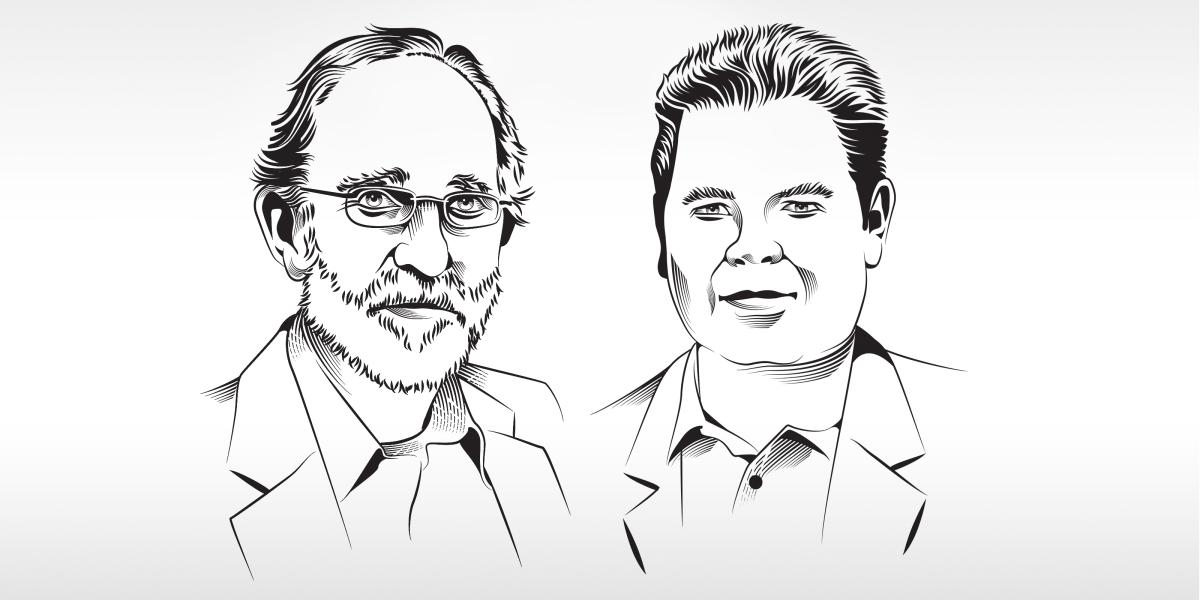The Exchange: Science Diplomacy
Nobel laureate Peter Agre and scientist Fidel Antonio Castro Smirnov chart a future for U.S.-Cuban scientific cooperation.
The week before President Obama jumpstarted the U.S.-Cuba rapprochement with a historic March visit to Havana, Cuban scientist Fidel Antonio Castro Smirnov visited Baltimore. Peter Agre, director of the Johns Hopkins Malaria Research Institute, invited Fidel Castro’s grandson to the Bloomberg School to give a talk and explore possibilities for collaboration. During a morning chat, the Nobel laureate and the Universidad de las Ciencias Informáticas professor surveyed Cuban science and the prospects for “science diplomacy,” an Agre trademark. “Our job is to do the science. And the science invariably leads to scientific friendships, which brings nations closer together,” he says.
FC: In 1960, we had … only 3,000 doctors and 30 percent illiteracy. Fidel said that the future of our country has to be a future of thinking men, a future of science men. In ’61, we eliminated illiteracy. We have, now, excellent indicators of education and science. We started to create a big biotechnology [initiative]. And now we are also working in the nanotechnology research, because we would like to go into precision medicine, molecular medicine. We are investing a lot in a center on nanotechnology … in order to bring a better health system to our people.
PA: Can I interject just one thing? My view of the most precious commodity in Cuban science is their brilliant and enthusiastic young scientists. They’re the future of science. The present is very impressive, but with such a cadre of enthusiastic young scientists, they can only go higher. I also see that as the greatest treasure of American science: our young scientists. Not that these old scientists have too much to apologize for, but our days are numbered. Science doesn’t just kind of move along. It jumps—breakthroughs—and these young scientists will do it. And they’ll be Cuban scientists, they’ll be American scientists, and scientists from all over the world. We should eliminate the barriers.
FC: Yesterday, I gave an informal seminar to the faculty members and students. And I also had the opportunity to speak a little bit about the science in Cuba, mainly in the biotechnology research and all we have done in health.
PA: It was a wonderful seminar. He invited the young people to come to Cuba. And afterward they all wanted to know how they could come. (Laughter.) Within the Hopkins community, there’s some strong opportunities for collaboration with Fidel Antonio on his specific interests. And his colleagues in Havana include people working in many different areas: vaccine development, infectious diseases, public health. There are a lot of opportunities for our extended families. And it’s time we worked together, particularly on things like chikungunya, Zika, dengue, because they’re a direct threat to Cuba and will be to the U.S.
"Most Americans don’t know anything about Cuban science. I think for a lot of years they were hearing a lot of bad things about Cuba."
FC: We have now a very good moment in the bilateral relations. And I think the Americans will have more opportunities to visit Cuba. And with this, we’ll have better opportunities also to organize together workshops there in Cuba. In the future, we could have more and more scientists in order to have better collaboration, better understanding and a growing friendship.
PA: A memorandum of understanding between Johns Hopkins and the Cuban scientific leadership is something I think many of us like, and we’ll pursue that. But we have to proceed cautiously and make sure we don’t promise things that we can’t fulfill. I think the first step is this visit of a young Cuban scientific leader and his father, Fidel Castro Díaz-Balart, who is the state science adviser to the president of Cuba, who [came] Wednesday to meet with the dean of the Bloomberg School of Public Health and the department chairs.
FC: Most Americans don’t know anything about Cuban science. I think for a lot of years they were hearing a lot of bad things about Cuba. And so, yesterday, the students told me that they were very much impressed seeing all of this vaccine medicine we have already done, our education, our innovations, the research we do. And I think with the new relationship, they will start hearing objective things from Cuba.
PA: I think the American public are very wonderful people, but they sometimes don’t have the good information. So, ignorance allows a lot of superstitions to survive.
FC: We had, also, a very good experience working together with the U.S. fighting Ebola. We worked together in Africa fighting against this disease. Cuba was the country that sent more doctors, and we worked in the U.S. installation. Also, I think the people don’t know that it was Fidel who promoted the biotechnology in Cuba in the early ’80s, when almost nobody knew what it was. We were a poor country—what could do in this area? And in that time, it was invested in Cuba around $2 billion. You know, we earn in biotechnology more than we earn with cigars and rum together.
PA: Mm-hmm. Somehow good news doesn’t pass as rapidly as bad news. So I think the American public is misled. The networks like to publicize bad things, so I suspect many Americans, from ignorance, no contact, assume Cuba is an island of rums, beards, cigars and dictatorship. That’s it. It’s like, there’s no greater understanding of the many wonderful things that have happened in Cuba. And the love of the Cuban people for Americans. So many of them actually do have relatives in the U.S. that there’s, I think, a heartfelt bond between the people of Cuba and the people of the U.S.
